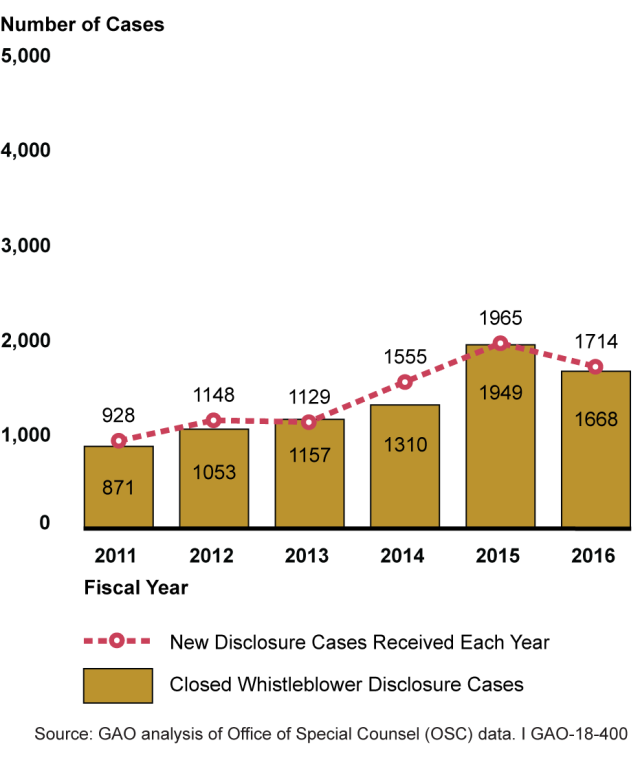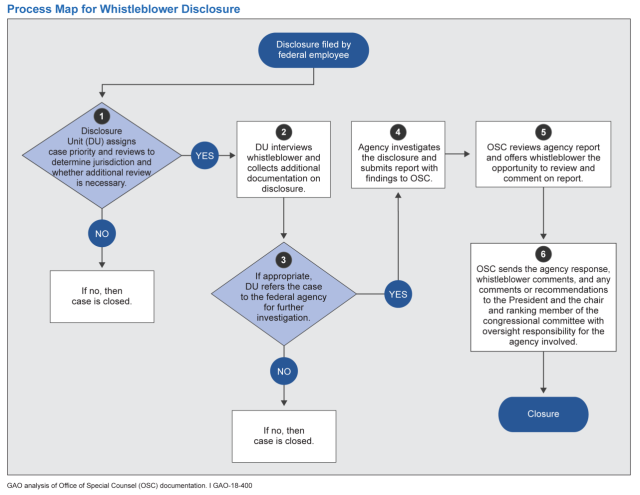Protecting Federal Whistleblowers
Federal whistleblowers—current, former, and prospective federal employees who allege wrongdoing—play a key role in saving taxpayer money and reducing fraud, waste, and abuse in the federal government. The Office of Special Counsel (OSC) is an independent body that reviews whistleblowers’ claims to see if they warrant a full investigation by the agency in question.
For National Whistleblower Day, today’s WatchBlog explains how OSC reviews allegations of potential wrongdoing by federal agencies.
Office of the Special Counsel
After 5 years of increases, OSC received over 1,700 allegations of wrongdoing in 2016—such as federal agencies not providing adequate training, not following procedures, or improperly spending funds.
Wait times
Having received an allegation from a whistleblower, OSC has to determine whether the allegation merits further investigation. OSC can decide quickly if:
- OSC lacks jurisdiction (such as an allegation from a federal contractor),
- the allegation lacks sufficient evidence, or
- the allegation was incorrectly filed.
OSC takes about a month to close these types of allegations, which make up about 80 percent of OSC’s whistleblower cases. But if OSC finds that the allegation has merit, this process could take a lot longer to resolve. Federal agencies have to investigate the allegations made against them and respond to OSC on both the result of their investigations and any actions they take to correct the allegations. We found that when OSC sends allegations to a federal agency, it can take almost 2 years to resolve the case.
Room for improvement
We reported that whistleblowers may have changed positions, left the agency, or given up on a remedy by the time the allegation is resolved. Whistleblowers may also be subject to retaliatory work environments during this long wait period.
In response to our report, OSC began informing whistleblowers that agency investigations may take longer than 60 days, the amount of time agencies are initially given to respond to allegations. However, we found that OSC could improve its process for reviewing whistleblower allegations. For example, OSC grants almost all federal agency requests for additional time to complete investigations. We recommended that OSC review and revise its policy for allowing these extensions.
Want to know more? Check out the full report. You can also report allegations of federal wrongdoing to our FraudNet.
Comments on GAO’s WatchBlog? Contact blog@gao.gov.
GAO Contacts
Related Products

GAO's mission is to provide Congress with fact-based, nonpartisan information that can help improve federal government performance and ensure accountability for the benefit of the American people. GAO launched its WatchBlog in January, 2014, as part of its continuing effort to reach its audiences—Congress and the American people—where they are currently looking for information.
The blog format allows GAO to provide a little more context about its work than it can offer on its other social media platforms. Posts will tie GAO work to current events and the news; show how GAO’s work is affecting agencies or legislation; highlight reports, testimonies, and issue areas where GAO does work; and provide information about GAO itself, among other things.
Please send any feedback on GAO's WatchBlog to blog@gao.gov.






